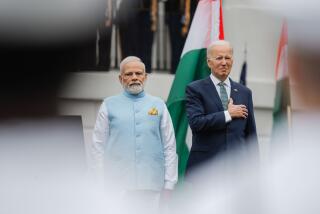India defends approach on climate policy : Envoy says efforts on global warming must allow room for growth.
- Share via
NEW DELHI — India remains flexible and its national climate-change plans are not the window dressing some critics charge, the nation’s lead negotiator said Friday.
But any agreement that might emerge from future global negotiations must give the South Asian powerhouse with the world’s second-largest population ample room to grow and develop economically, said Shyam Saran, the prime minister’s special envoy on climate change.
“Climate change shouldn’t become a mechanism for the perpetuation of poverty,” Saran said in a meeting with reporters.
India, with a population of more than 1.1 billion, is expected to surpass China as the world’s most populous nation in the next few decades. The prospect of hundreds of millions of Indians and Chinese driving newly acquired cars, running air conditioners and consuming vast amounts of fossil fuels as their economies grow has climate-change experts gravely concerned.
Carbon dioxide emissions are already increasing rapidly in India and China, as consumption grows in line with national aspirations. Per capita, however, the levels remain well below those in the United States and Europe.
Both Asian nations have come under growing pressure to accept binding emissions targets before next month’s United Nations climate-change conference in Copenhagen. So far they have resisted, with officials arguing that it’s unfair for wealthy nations that have degraded the environment for decades to now deny developing countries the opportunity to get ahead.
India’s annual carbon emissions are about only 1.1 or 1.2 tons per person, Saran said, a fraction of the 19 tons per capita that Americans produce. Despite India’s massive population, the nation accounts for only 4% of global emissions.
“If you say India is a major polluter, I contest that,” he said.
The significant gap between the negotiating stances of developed and developing nations, and even between those of the United States and Europe, makes it increasingly unlikely that a deal will emerge from the two-week meeting in Denmark, which begins Dec. 7.
The timing of the meeting hasn’t helped. Any agreement would probably require that developed nations provide funding and technology to less-developed countries, a step most governments aren’t keen to do during an economic downturn.
“This is not the best time,” Saran said. “You can’t divorce these negotiations from the economic situation we face.”
In June 2008, India unveiled a national climate action plan that includes tax holidays for solar plants, more money for research, and goals for higher energy efficiency and more sustainable agriculture.
But critics say the plan is largely a public relations move, without much chance of producing significant results.
Saran defended the government program. “I see no reason people should think the National Action Plan on Climate Change is just for public relations,” he said. “Why not wait and see?” This month, the government also issued a study on Himalayan glaciers arguing that there was no conclusive evidence that climate change was causing the glaciers to recede.
Shresth Tayal, a glaciologist with the Energy and Resource Institute in New Delhi, said the study was not subject to peer review, failed to explain its methodology and appeared to ignore much of the established science on the topic.
“Whatever has been presented is self-contradictory,” he said.
Saran disagreed. The government hasn’t denied that some glaciers are receding, he said; it’s just said that others appear to be expanding and more study is needed.
And though the outlook for a deal next month may not be great, the negotiator said, it’s important to figure out how to maintain momentum and retain a civil tone.
“I don’t think it’s in anyone’s interest that Copenhagen break up in mutual recriminations,” he said. “There’s too much at stake to end up with finger-pointing.”
--
Anshul Rana in The Times’ New Delhi Bureau contributed to this report.
More to Read
Sign up for Essential California
The most important California stories and recommendations in your inbox every morning.
You may occasionally receive promotional content from the Los Angeles Times.













